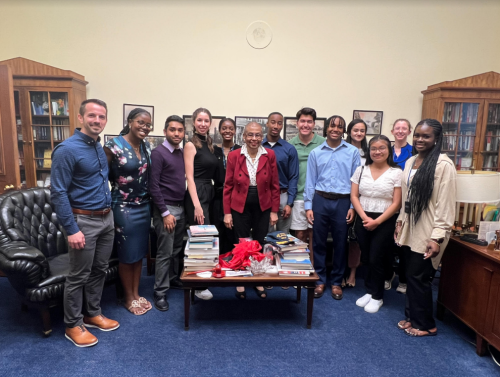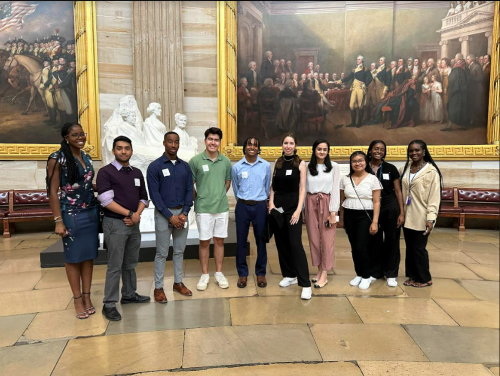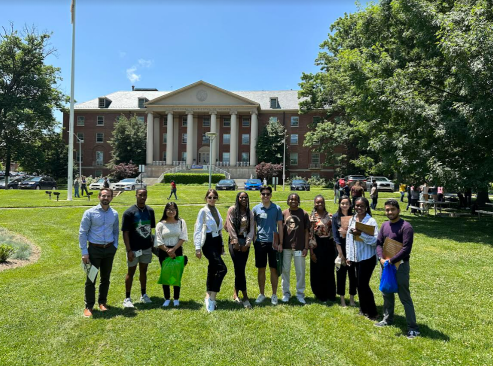2024 Summer EPGRAD Program
Expanding the Pipeline to Graduate Research in Alzheimer’s Disease and Related Dementias (EPGRAD) Program
The Expanding the Pipeline to Graduate Research in Alzheimer’s Disease and Related Dementias (EPGRAD) Program is an 8-week summer education and research training opportunity for undergraduates that is designed to encourage students from communities that are underrepresented in the biomedical and behavioral health sciences to pursue graduate studies and careers in Alzheimer’s disease and related dementias research.
The EPGRAD Program takes place at both George Washington University in Washington, DC and Boston University in Boston, MA. EPGRAD Program participants will spend 4 weeks at each host institution during the program learning from and working with faculty mentors who are leaders in the field of Alzheimer’s disease and related dementias. In addition to working on research projects and participating in educational activities, EPGRAD Program participants will also have many opportunities to network and participate in engaging social activities in both Washington and Boston.
The EPGRAD Program is funded by grant R25 AG081177 from the National Institutes of Health (NIH) National Institute on Aging (NIA). The first cohort of EPGRAD scholars completed the program in the summer of 2023.
GWU Program Director: Dr. Adam Ciarleglio
BU Program Directors: Dr. Rhoda Au and Dr. Hugo Aparicio
Join T.E.A.M Milken! T.E.A.M. Milken is open to all GWSPH undergraduate majors. Our goal is to provide individualized support to students so you will thrive at GW and be prepared to launch your public health career.
Key components of the fully-funded 8-week summer EPGRAD Program:
- Education
-
Students will participate in short courses covering fundamental concepts in epidemiology and data science in the context of Alzheimer’s disease and related dementias research. Students will also have opportunities to participate in seminars, journal clubs, and field trips as well as graduate school admissions counseling, training in the responsible conduct of research, and training in skills essential for graduate school success.
- Research
-
Students will work with faculty mentors on a primary research project based on the Framingham Heart Study Brain Aging Program and present their findings at an end-of-program research symposium. Research projects will require the use of epidemiologic and data science skills learned during the program.
- Networking and Community
-
Students will have many opportunities to network with other EPGRAD Program participants and faculty, attend fun social events in Washington and Boston, and stay connected after the summer program is completed. 2024 Program Dates: The program will run from May 26 to July 20, 2024. The first 4 weeks (May 26 – June 22) will take place at the George Washington University in Washington, DC and the last 4 weeks (June 23 – July 20) will take place at Boston University in Boston, MA. All EPGRAD participants are expected to participate full-time during the 8-week program.
Details on Travel, Housing, Meals, and Stipend:
- Travel
-
Travel to Washington, DC at the start of the program and travel from Boston, MA at the end of the program will be arranged and funded for all participants once they are accepted into the program. Travel between Washington, DC and Boston, MA will also be arranged and funded. In addition, SmartTrip and CharlieCard public transportation passes will be provided to students during the 8-week program.
- Housing
-
Student housing for the entire 8-week program will be provided in student dormitories on the George Washington University and Boston University campuses.
- Meals
-
All students will receive a GWorld Card with funds loaded for purchasing three meals per day on the George Washington University campus and Terrier Cards with funds loaded to purchase three meals per day on the Boston University campus.
- Stipend
-
EPGRAD participants will receive a stipend of $2800 for the 8-week period.
Funding for EPGRAD is provided by the National Institutes of Health through grant R25AG081177.
To be eligible to participate in the EPGRAD Program, applicants must:
- Be enrolled in and have completed at least one year as an undergraduate in good standing at an accredited college or university in the US but should not have graduated by the start of the program (i.e., should be a rising sophomore, junior, or senior). They may also be enrolled at a community or junior college, completing at least three courses per academic term, with at least 30 credits completed by the start of the EPGRAD Program.
- Have completed at least one semester of precalculus or higher-level mathematics, regardless of major. AP Calculus and/or AP Statistics credit will count towards this requirement.
- Be a citizen or non-citizen national of the US or have been admitted for permanent residence.
Applications from all eligible applicants will be considered. We encourage applications from eligible interested students who fall into one or more of the categories considered as “Underrepresented Populations in the U.S. Biomedical, Clinical, Behavioral and Social Sciences Research Enterprise” (based on the Notice of NIH’s Interest in Diversity), which include:
- Individuals from racial and ethnic groups that have been shown by the National Science Foundation to be underrepresented in health-related sciences on a national basis (see data at http://www.nsf.gov/statistics/showpub.cfm?TopID=2&SubID=27) and the report Women, Minorities, and Persons with Disabilities in Science and Engineering). The following racial and ethnic groups have been shown to be underrepresented in biomedical research: Blacks or African Americans, Hispanics or Latinos, American Indians or Alaska Natives, Native Hawaiians and other Pacific Islanders. In addition, it is recognized that underrepresentation can vary from setting to setting; individuals from racial or ethnic groups that can be demonstrated convincingly to be underrepresented by the grantee institution should be encouraged to participate in NIH programs to enhance diversity. For more information on racial and ethnic categories and definitions, see the OMB Revisions to the Standards for Classification of Federal Data on Race and Ethnicity (https://www.govinfo.gov/content/pkg/FR-1997-10-30/html/97-28653.htm).
- Individuals with disabilities, who are defined as those with a physical or mental impairment that substantially limits one or more major life activities, as described in the Americans with Disabilities Act of 1990, as amended. See NSF data at, https://www.nsf.gov/statistics/2017/nsf17310/static/data/tab7-5.pdf.
- Individuals from disadvantaged backgrounds, defined as those who meet two or more of the following criteria:
- Were or currently are homeless, as defined by the McKinney-Vento Homeless Assistance Act (Definition: https://nche.ed.gov/mckinney-vento/);
- Were or currently are in the foster care system, as defined by the Administration for Children and Families (Definition: https://www.acf.hhs.gov/cb/focus-areas/foster-care);
- Were eligible for the Federal Free and Reduced Lunch Program for two or more years (Definition: https://www.fns.usda.gov/school-meals/income-eligibility-guidelines);
- Have/had no parents or legal guardians who completed a bachelor’s degree(see https://nces.ed.gov/pubs2018/2018009.pdf);
- Were or currently are eligible for Federal Pell grants(Definition: https://www2.ed.gov/programs/fpg/eligibility.html);
- Received support from the Special Supplemental Nutrition Program for Women,Infants and Children (WIC) as a parent or child(Definition: https://www.fns.usda.gov/wic/wic-eligibility-requirements).
- Grew up in one of the following areas: a) a U.S. rural area, as designated by the Health Resources and Services Administration (HRSA) Rural Health Grants Eligibility Analyzer (https://data.hrsa.gov/tools/rural-health), or b) a Centers for Medicare and Medicaid Services-designated Low-Income and Health Professional Shortage Areas (qualifying zip codes are included in the file). Only one of the two possibilities in last point can be used as a criterion for the disadvantaged background definition.
- Women: Literature shows that women from the above backgrounds (categories 1, 2, and 3) face particular challenges at the graduate level and beyond in scientific fields. (See, e.g., From the NIH: A Systems Approach to Increasing the Diversity of Biomedical Research Workforce https://www.ncbi.nlm.nih.gov/pmc/articles/PMC5008902/ ).
Leadership Team
Hugo Aparicio, MD, MPH
Assistant Professor, Neurology
Boston University
Rhoda Au, PhD
Professor, Anatomy & Neurobiology
Boston University
Adam Ciarleglio, PhD
Assistant Professor, Biostatistics
George Washington University
Sherral Devine, PhD
Assistant Professor, Anatomy & Neurobiology
Boston University
Maureen O'Connor, PsyD
Assistant Professor, Neurology
Boston University
Program Staff
Hailey Grace Ames
Research Assistant, Framingham Heart Study Brain Aging Program
Boston University
Diane Britton
Fiscal Manager, Biostatistics and Bioinformatics
George Washington University
Stephanie Lee
Administrative Associate, Biostatistics and Bioinformatics
George Washington University
Mentors and Affiliated Faculty
Loretta DiPietro, PhD
Professor, Exercise and Nutrition Science
George Washington University
Chunyu Liu, PhD
Associate Professor, Biostatistics
Boston University
Trudy Mallinson, PhD
Associate Professor, Clinical Research and Leadership
George Washington University
Paul Marvar, PhD
Associate Professor, Pharmacology and Physiology
George Washington University
Jesse Mez, MD
Associate Professor, Neurology
Boston University
Paul Ndebele, PhD
Professorial Lecturer, Global Health
George Washington University
Melinda Power, ScD
Associate Professor, Epidemiology
George Washington University
Emma Stapp, PhD
Assistant Professor, Epidemiology
George Washington University
Thor Stein, MD, PhD
Associate Professor, Pathology and Laboratory Medicine
Boston University
Robert Turner, PhD
Assistant Professor, Clinical Research and Leadership
George Washington University
Meg Ulfers, PhD
Associate Professor, Epidemiology
George Washington University
Nicola Wolfe, PhD
Professorial Lecturer, Psychological and Brain Sciences
George Washington University
Leadership Team
Hugo Aparicio, MD, MPH
Assistant Professor, Neurology
Boston University
Rhoda Au, PhD
Professor, Anatomy & Neurobiology
Boston University
Adam Ciarleglio, PhD
Assistant Professor, Biostatistics
George Washington University
Sherral Devine, PhD
Assistant Professor, Anatomy & Neurobiology
Boston University
Maureen O'Connor, PsyD
Assistant Professor, Neurology
Boston University
Program Staff
Hailey Grace Ames
Research Assistant, Framingham Heart Study Brain Aging Program
Boston University
Diane Britton
Fiscal Manager, Biostatistics and Bioinformatics
George Washington University
Stephanie Lee
Administrative Associate, Biostatistics and Bioinformatics
George Washington University
Mentors and Affiliated Faculty
Loretta DiPietro, PhD
Professor, Exercise and Nutrition Science
George Washington University
Chunyu Liu, PhD
Associate Professor, Biostatistics
Boston University
Trudy Mallinson, PhD
Associate Professor, Clinical Research and Leadership
George Washington University
Paul Marvar, PhD
Associate Professor, Pharmacology and Physiology
George Washington University
Jesse Mez, MD
Associate Professor, Neurology
Boston University
Paul Ndebele, PhD
Professorial Lecturer, Global Health
George Washington University
Melinda Power, ScD
Associate Professor, Epidemiology
George Washington University
Emma Stapp, PhD
Assistant Professor, Epidemiology
George Washington University
Thor Stein, MD, PhD
Associate Professor, Pathology and Laboratory Medicine
Boston University
Robert Turner, PhD
Assistant Professor, Clinical Research and Leadership
George Washington University
Meg Ulfers, PhD
Associate Professor, Epidemiology
George Washington University
Nicola Wolfe, PhD
Professorial Lecturer, Psychological and Brain Sciences
George Washington University
Dr. Ali Rahnavard, Program Director
Dr. Qing Pan
Dr. Pramita Bagchi
HERE is the complete list of DBB faculty
-
EPGRAD 2023
-
- Mia Rivers
-
Mia is an early graduate as of December 2023, receiving her B.S. of Biology from Howard University. She has participated in the HU ADAR program since her freshman year. Her research has heavily focused on pathology and genetic risk for developing Alzheimer’s Disease. After going on a tour of the NIH, organized by EPGRAD, she was inspired to apply for a post-baccalaureate position there. She currently works in Dr. Mindell’s lab within the NINDS. She looks forward to pursuing an education and career in pediatric neurology through an MD/PhD.
- Morgan Scott
-
Morgan Scott is a senior Honors Psychology student with a minor in Biology at American University. Her research interests center around studying the relationship between HIV and opioid use disorder, with a particular focus on conceptualizing a potential bidirectional relationship by investigating the neuroanatomical and neurocircuitry overlap between the two pathologies. She was inspired to apply for the EPGRAD program due to her passion for research and advocacy, as well as a personal connection to Alzheimer's disease. Through the program, she received encouragement from her peers and mentors, and was motivated by the knowledge and skills gained from the training. As a result, she is now applying to post-baccalaureate programs in hopes of pursuing an MD/PhD.
- Jack White
-
Jack is a senior at the University of Rochester, graduating this Spring with a BS in Neuroscience. His undergraduate research was primarily focused on understanding the glymphatic system (the brain's waste clearance system) and its relationship with sleep, Alzheimer's Disease and drug delivery methods. He has also run clinical studies through a cognitive development lab and conducted MRI and CT experiments while abroad in Copenhagen, Denmark. Jack was inspired by his cohort's visit to the NIH main campus in Bethesda, MD last summer, and he has now accepted a postbac position there to study acquired hearing loss and biomarkers for inner ear injury under the Hertzano Lab (NIDCD). He will conduct research there for the next two years before applying to MD-PhD programs in hopes of becoming a child neurologist
- Caleb Franklin
-
Caleb Franklin is an undergraduate student at the University of Louisiana at Lafayette studying Pre Med Biology and Chemistry. Caleb is interested in pursuing an MD and specializing in either Anesthesiology, Neurology, or Cardio. In Lafayette Caleb is very involved with his community through his Reginald F. Lewis Scholars program and his fraternity, Alpha Phi Alpha Fraternity Inc. In his free time, Caleb enjoys working out, listening to music, cooking and finding new ways to improve himself. Through the EPGRAD Experience Caleb was exposed to a multitude of different resources, knowledge and career routes that interested him greatly. He also had a great time exploring the cities of Washington, DC and Boston. From his experience in the program, Caleb was able to bring information and tools back to his home campus and help other students on their career paths.
- Mateo Rodriguez
-
Mateo Rodriguez is part of Howard University's undergraduate class of 2026. He is a biology major from New York on the pre-med track, with endeavors of becoming either a pediatrician or psychiatrist. His research so far is primarily focused on neuroscience and the onset of varying dementias, however he intends on immersing himself in pediatric-related research as he continues his undergraduate studies.
- Maheen Nawaz
-
Maheen Nawaz received her undergraduate degree in Neuroscience from the George Washington University and is currently working on her Master's of Public Health at the Milken Institute School of Public Health at GW. Maheen has previous clinical experience and looks forward to attending medical school in the future.
-
EPGRAD 2024
- Coming Soon
-
EPGRAD 2023
-


Professor Ciarleglio, Professor Power, and EPGRAD scholars met with Congresswoman Eleanor Holmes Norton at the Capitol

EPGRAD scholars and Professor Ciarleglio visit the NIH campus in Bethesda

Professor Ciarleglio and EPGRAD scholars attend a goodbye dinner prior to departure to Boston University
Scholars surprised the EPGRAD coordinators just after their Symposium at the Boston University Medical School campus with flowers and signed photographs!First-time dim sum experience for many of the Scholars at Hei La Moon in Boston’s Chinatown
A hands-on demonstration of gross brain anatomy at the Boston University Medical School – real brains and brain stems included!
Inaugural Program with Undergraduates Launched to Study Alzheimer’s and Dementia
10 scholars attended an inaugural Summer Program from May to July, 2023, launched by GWSPH’s Department of Biostatistics and Bioinformatics and the Institute for Brain Health & Dementia and Boston University’s Framingham Heart Study-Brain Aging Program. The Expanding the Pipeline to Graduate Research in Alzheimer’s Disease and Related Dementias (EPGRAD) scholars spent half their training experience at GW from May 22 to June 16 and the other half at Boston University from June 19 to July 14.
During the four weeks at GW, these young scholars engaged in rigorous activities of research, training, independent study, lectures, labs and seminars on a spectrum of Alzheimer Disease and Related Dementias (ADRD) topics from both epidemiological and biostatistical perspectives. They collaborated with GWSPH faculty to seek academic and career mentorship and also met with GWSPH admissions to explore graduate school and careers. GWSPH faculty included Dr. Adam Ciarleglio (DBB), Dr. Melinda Power (DEPI), Dr. Meg Ulfers (DEPI), Loretta DiPietro (DENS), and Dr. Emma K. Stapp (DEPI).
Beyond the classroom, these students visited the Capitol to meet with DC Congresswoman Eleanor Holmes Norton and also toured the National Institutes of Health (NIH) campus in Bethesda. These field trips enabled them to understand the distinct responsibilities of both policymakers and researchers in influencing ADRD research. They also sought to unwind during leisurely excursions to the Washington Nationals baseball game and a National Symphony Orchestra concert to view a performance of “Romeo and Juliet” at the Kennedy Center.
-
EPGRAD 2024
- Coming Soon..











